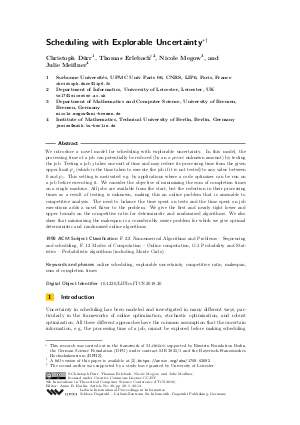Scheduling with Explorable Uncertainty
Authors Christoph Dürr, Thomas Erlebach, Nicole Megow, Julie Meißner
-
Part of:
Volume:
9th Innovations in Theoretical Computer Science Conference (ITCS 2018)
Part of: Series: Leibniz International Proceedings in Informatics (LIPIcs)
Part of: Conference: Innovations in Theoretical Computer Science Conference (ITCS) - License:
 Creative Commons Attribution 3.0 Unported license
Creative Commons Attribution 3.0 Unported license
- Publication Date: 2018-01-12
File

PDF
LIPIcs.ITCS.2018.30.pdf
- Filesize: 0.62 MB
- 14 pages
Document Identifiers
Subject Classification
Keywords
- online scheduling
- explorable uncertainty
- competitive ratio
- makespan
- sum of completion times
Metrics
- Access Statistics
-
Total Accesses (updated on a weekly basis)
0PDF Downloads0Metadata Views
Abstract
We introduce a novel model for scheduling with explorable uncertainty. In this model, the processing time of a job can potentially be reduced (by an a priori unknown amount) by testing the job. Testing a job j takes one unit of time and may reduce its processing time from the given upper limit p'_j (which is the time taken to execute the job if it is not tested) to any value between 0 and p'_j. This setting is motivated e.g. by applications where a code optimizer can be run on a job before executing it. We consider the objective of minimizing the sum of completion times on a single machine. All jobs are available from the start, but the reduction in their processing times as a result of testing is unknown, making this an online problem that is amenable to competitive analysis. The need to balance the time spent on tests and the time spent on job executions adds a novel flavor to the problem. We give the first and nearly tight lower and upper bounds on the competitive ratio for deterministic and randomized algorithms. We also show that minimizing the makespan is a considerably easier problem for which we give optimal deterministic and randomized online algorithms.
Cite As Get BibTex
Christoph Dürr, Thomas Erlebach, Nicole Megow, and Julie Meißner. Scheduling with Explorable Uncertainty. In 9th Innovations in Theoretical Computer Science Conference (ITCS 2018). Leibniz International Proceedings in Informatics (LIPIcs), Volume 94, pp. 30:1-30:14, Schloss Dagstuhl – Leibniz-Zentrum für Informatik (2018)
https://doi.org/10.4230/LIPIcs.ITCS.2018.30
BibTex
@InProceedings{durr_et_al:LIPIcs.ITCS.2018.30,
author = {D\"{u}rr, Christoph and Erlebach, Thomas and Megow, Nicole and Mei{\ss}ner, Julie},
title = {{Scheduling with Explorable Uncertainty}},
booktitle = {9th Innovations in Theoretical Computer Science Conference (ITCS 2018)},
pages = {30:1--30:14},
series = {Leibniz International Proceedings in Informatics (LIPIcs)},
ISBN = {978-3-95977-060-6},
ISSN = {1868-8969},
year = {2018},
volume = {94},
editor = {Karlin, Anna R.},
publisher = {Schloss Dagstuhl -- Leibniz-Zentrum f{\"u}r Informatik},
address = {Dagstuhl, Germany},
URL = {https://drops.dagstuhl.de/entities/document/10.4230/LIPIcs.ITCS.2018.30},
URN = {urn:nbn:de:0030-drops-83360},
doi = {10.4230/LIPIcs.ITCS.2018.30},
annote = {Keywords: online scheduling, explorable uncertainty, competitive ratio, makespan, sum of completion times}
}
Author Details
References
-
Allan Borodin and Ran El-Yaniv. Online Computation and Competitive Analysis. Cambridge University Press, 1998.

- Christoph Dürr, Thomas Erlebach, Nicole Megow, and Julie Meißner. Scheduling with explorable uncertainty. CoRR, abs/1709.02592, 2017. URL: http://arxiv.org/abs/1709.02592.
-
Thomas Erlebach, Michael Hoffmann, Danny Krizanc, Matús Mihalák, and Rajeev Raman. Computing minimum spanning trees with uncertainty. In 25th International Symposium on Theoretical Aspects of Computer Science (STACS 2008), pages 277-288, 2008.

-
Tomás Feder, Rajeev Motwani, Liadan O'Callaghan, Chris Olston, and Rina Panigrahy. Computing shortest paths with uncertainty. Journal of Algorithms, 62(1):1-18, 2007.

-
Tomás Feder, Rajeev Motwani, Rina Panigrahy, Chris Olston, and Jennifer Widom. Computing the median with uncertainty. SIAM Journal on Computing, 32(2):538-547, 2003.

-
Marc Goerigk, Manoj Gupta, Jonas Ide, Anita Schöbel, and Sandeep Sen. The robust knapsack problem with queries. Computers & OR, 55:12-22, 2015.

-
Manoj Gupta, Yogish Sabharwal, and Sandeep Sen. The update complexity of selection and related problems. In IARCS Annual Conference on Foundations of Software Technology and Theoretical Computer Science (FSTTCS 2011), volume 13 of LIPIcs, pages 325-338. Schloss Dagstuhl - Leibniz-Zentrum für Informatik, 2011.

-
Simon Kahan. A model for data in motion. In 23rd Annual ACM Symposium on Theory of Computing (STOC 1991), pages 267-277, 1991.

-
Sanjeev Khanna and Wang-Chiew Tan. On computing functions with uncertainty. In 20th Symposium on Principles of Da18th Annual Symposium on Database Systems (PODS 2001), pages 171-182, 2001.

-
Retsev Levi. Practice driven scheduling models. Talk at Dagstuhl Seminar 16081: Scheduling, 2016.

-
Nicole Megow, Julie Meißner, and Martin Skutella. Randomization helps computing a minimum spanning tree under uncertainty. In Algorithms - Proceedings of the 23rd Annual European Symposium (ESA 2015), LNCS 9294, pages 878-890. Springer, 2015.

-
Chris Olston and Jennifer Widom. Offering a precision-performance tradeoff for aggregation queries over replicated data. In 26th International Conference on Very Large Data Bases (VLDB 2000), pages 144-155, 2000.

-
Yaron Shaposhnik. Exploration vs. Exploitation: Reducing Uncertainty in Operational Problems. PhD thesis, Sloan School of Management, MIT, 2016.

-
Andrew Chi-Chin Yao. Probabilistic computations: Toward a unified measure of complexity. In 18th Annual Symposium on Foundations of Computer Science (FOCS 1977), pages 222-227. IEEE, 1977.

